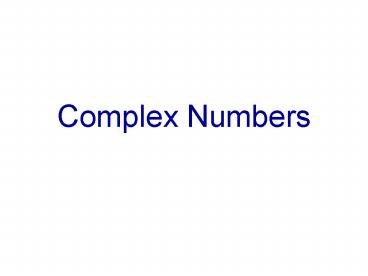Complex Numbers - PowerPoint PPT Presentation
1 / 41
Title:
Complex Numbers
Description:
Heron. Negative numbers? Where did they come from? Heron. Negative numbers? ... Heron. Negative numbers? Girolamo Cardona & 'fictitious' numbers ... – PowerPoint PPT presentation
Number of Views:779
Avg rating:3.0/5.0
Title: Complex Numbers
1
Complex Numbers
2
Presentation Outline
- What are complex numbers?
- Where did they come from?
- What properties do they have?
- Are they actually useful?
3
What are complex numbers?
- a bi where a,b and i v-1
4
What are complex numbers?
- a bi where a,b and i v-1
- ordered pairs of real numbers (a, b)
5
What are complex numbers?
- a bi where a,b and i v-1
- ordered pairs of real numbers (a, b)
- C is a field
6
What are complex numbers?
- a bi where a,b and i v-1
- ordered pairs of real numbers (a, b)
- C is a field
- R is a subfield of C
7
Where did they come from?
- Heron
8
Heron of Alexandria (between 150 BC and 300 AD)
9
Where did they come from?
- Heron
- Negative numbers?
10
Where did they come from?
- Heron
- Negative numbers?
- Cardona fictitious numbers
11
Girolamo Cardano (1501 - 76)
12
Where did they come from?
- Heron
- Negative numbers?
- Girolamo Cardona fictitious numbers
- René Descartes imaginary numbers
13
René Descartes (1596 1650)
14
Where did they come from?
- Heron
- Negative numbers?
- Girolamo Cardona fictitious numbers
- René Descartes imaginary numbers
- Leonhard Euler i
15
Leonhard Euler (1707 1783)
16
Where did they come from?
- Heron
- Negative numbers?
- Girolamo Cardona fictitious numbers
- René Descartes imaginary numbers
- Leonhard Euler
- Caspar Wessel Carl Friedrich Gauss
17
Caspar Wessel, (1745 - 1818) Johann Carl
Friedrich Gauss (1777 - 1855)
- ?
18
Where did they come from?
- Heron
- Negative numbers?
- Girolamo Cardona fictitious numbers
- René Descartes imaginary numbers
- Leonhard Euler
- Caspar Wessel Carl Friedrich Gauss
- Jean Robert Argand
19
Jean Robert Argand (1768 - 1822)
20
What properties do they have?
- Argand diagram
21
(No Transcript)
22
What properties do they have?
- Argand diagram
- Addition / subtraction
23
Addition / subtraction
24
What properties do they have?
- Argand diagram
- Addition / subtraction
- Negation
25
Negation
26
What properties do they have?
- Argand diagram
- Addition / subtraction
- Negation
- Absolute value
27
Absolute value
28
What properties do they have?
- Argand diagram
- Addition / subtraction
- Negation
- Absolute value
- Multiplication
29
(No Transcript)
30
(No Transcript)
31
What properties do they have?
- Argand diagram
- Addition / subtraction
- Negation
- Absolute value
- Multiplication
- Reciprocal and conjugate
32
(No Transcript)
33
What properties do they have?
- Argand diagram
- Addition / subtraction
- Negation
- Absolute value
- Multiplication
- Reciprocal and conjugate
- Nice properties
34
Nice properties
(cosx isinx)n cos(nx) isin(nx).
35
Are they actually useful?
36
Are they actually useful?
- Improper integrals
37
(No Transcript)
38
Improper integrals
39
Are they actually useful?
- Improper integrals
- Quantum mechanics
- Differential equations
- Fluid dynamics
- Phasors
- Fractals
40
Pretty fractal of Mandelbrot set to finish
41
Fractal nutters
- Fri. 4th March The Molong Music and Arts Festival
Molong - The Australian band GangGajang (http//www.ganggaj
ang.com/) has a song Time (and the Mandelbrot
set) .































